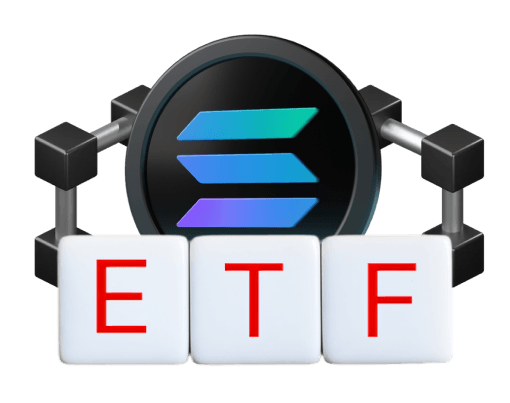Solana ETFs erforschen:
Eine neue Grenze im Krypto-Universum


In the dynamic landscape of cryptocurrency, Solana distinguishes itself with high-speed, scalable blockchain technology. As financial products for digital assets mature, investors are watching for the next wave of innovation, such as a potential spot Solana ETF. Understanding this financial instrument is crucial for grasping how it could reshape market dynamics. While no official product has been approved, the discussion signifies a major milestone for Solana and the broader crypto ecosystem. A regulated ETF would offer a structured way to gain exposure to Solana's performance without the complexities of direct token ownership, potentially broadening its appeal to a wider audience.
A Potential Spot Solana ETF: Direct Exposure to a Leading Blockchain
A spot Solana ETF would represent a pivotal development for cryptocurrency investment. Similar to the spot Bitcoin ETFs, such a product would track the price of Solana directly, offering investors a straightforward correlation to SOL's real-time market value. The introduction of a regulated ETF could significantly increase liquidity and add a layer of security often required by institutional investors.
Furthermore, approval from a major regulatory body like the U.S. Securities and Exchange Commission (SEC) would grant Solana a new level of legitimacy in mainstream finance. The path toward a spot Solana ETF is closely watched, as it could set a precedent for other alternative cryptocurrencies. Eventual approval would likely boost investor confidence and expand crypto investment options beyond Bitcoin and Ethereum.
Kaufen Sie Krypto schnell, einfach und sicher mit Switchere!
Jetzt kaufen
Scannen Sie, um die App herunterzuladen
Fostering Innovation and Market Integration
The potential for a Solana ETF is compelling due to its underlying technology. The Solana protocol, designed for rapid and low-cost transactions, is an attractive foundation for various financial applications. This positions Solana not just as a digital asset but as a key element in the integration of traditional finance and blockchain technology. The journey doesn't end with regulatory discussions; if an ETF is launched, its market debut and performance will be critical metrics. Investors are keen to see how such an instrument would perform compared to direct cryptocurrency holdings and traditional assets.
The success of a Solana ETF could pave the way for more cryptocurrencies to enter the regulated fund space, fostering a more diverse and secure trading environment. This initiative is about more than creating another investment vehicle; it's about reshaping the financial landscape to be more inclusive and technologically advanced. It also highlights the need for exchanges to adapt their systems to handle blockchain-based securities, ensuring robust security, transparent pricing, and efficient trading to protect investors.
How to Store SOL Tokens
Storing SOL tokens securely is crucial for any investor. The choice of wallet depends on individual needs for security and convenience. The primary options include:
Hardware Wallets
Offering the highest level of security, these physical devices store your private keys offline. Popular examples that support SOL include Ledger and Trezor.
Software Wallets
These applications for computers or smartphones provide a good balance of security and ease of use. Well-known options include Phantom, Solflare, and Exodus.
Web Wallets
Accessible through a web browser, these are convenient for quick transactions but are generally less secure than hardware or software wallets.
Conclusion
In summary, the prospect of a spot Solana ETF marks a significant potential development at the intersection of cryptocurrency and traditional finance. Fueled by Solana's innovative technology and growing investor interest, such a product could set new standards for what digital assets can achieve within regulated markets. While approval is not yet a reality, the ongoing conversation highlights Solana's potential to transform the financial landscape. As this new chapter unfolds, Solana remains a key player in the broader story of economic and technological innovation.
Häufig gestellte Fragen
-
What is a spot Solana ETF?
A spot Solana ETF is an exchange-traded fund that would hold SOL, the native token of the Solana blockchain, directly. The fund's share price would track the market price of Solana, offering investors exposure to the asset through a traditional brokerage account without them needing to buy and store the cryptocurrency. -
Has a spot Solana ETF been approved?
No, as of mid-2024, a spot Solana ETF has not been approved by regulatory bodies like the U.S. Securities and Exchange Commission (SEC). While the approval of spot Bitcoin and Ethereum ETFs has fueled speculation, a Solana ETF remains a potential future product. -
How can I buy SOL tokens?
SOL tokens can be purchased on most major cryptocurrency exchanges. Typically, you create an account, deposit fiat currency (like USD or EUR) via bank transfer or card, and then trade it for SOL. You can also trade other cryptocurrencies for SOL. -
How does Solana differ from Bitcoin?
Solana and Bitcoin serve different primary purposes. Bitcoin is mainly seen as a decentralized store of value, prioritizing security and network robustness. Solana is a high-performance blockchain designed for speed and low transaction costs, making it ideal for scalable decentralized applications (dApps), NFTs, and decentralized finance (DeFi). -
What is Solana's main technological advantage?
Solana's key advantage is its unique Proof-of-History (PoH) consensus mechanism, used in conjunction with Proof-of-Stake (PoS). PoH creates a verifiable, cryptographic timestamp for each transaction, allowing the network to process them in sequence at very high speeds. This enables Solana to handle thousands of transactions per second at a low cost.
Unsere Website verwendet Cookies. Unsere Cookie-Richtlinie
